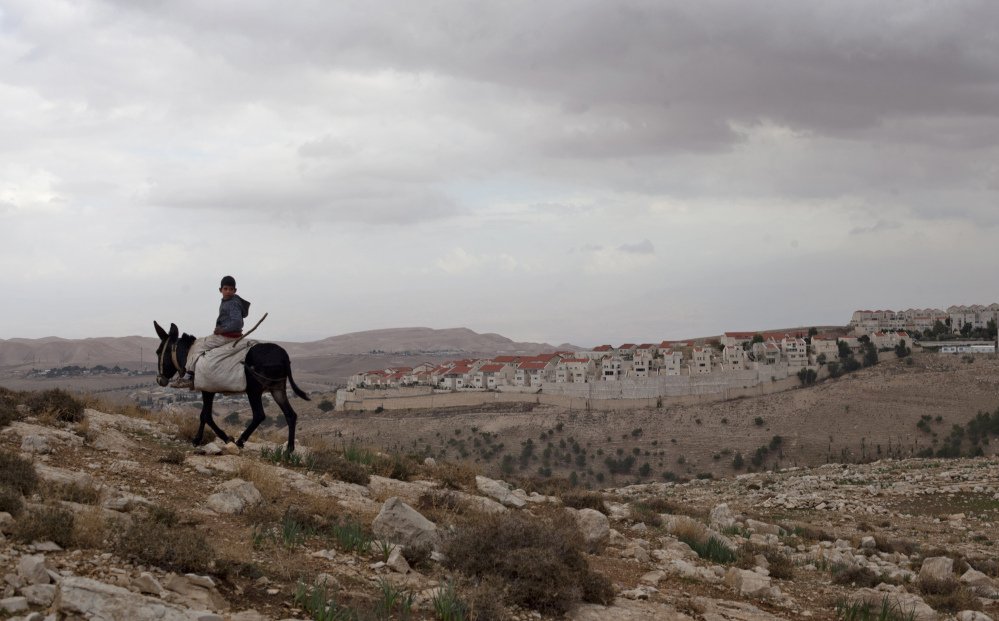JERUSALEM — Israel’s prime minister is moving ahead with a contentious law that would legalize dozens of settlement outposts in the West Bank, despite claims by experts that the bill itself is illegal and a warning from the White House that settlement construction “may not be helpful.”
Prime Minister Benjamin Netanyahu is under intense pressure from members of his coalition to bring the bill to a vote in parliament following last week’s court-ordered demolition of an illegally built settlement outpost. But he risks drawing angry international condemnations, possibly even from the ostensibly friendly Trump administration, if he pushes forward.
Netanyahu’s nationalist coalition is dominated by West Bank settlers and their supporters. The Jewish Home, a powerful coalition ally, has been leading the calls to vote on the outpost law this week, perhaps as soon as Monday. The Jewish Home believes that with a friendly president in office, it is time for Netanyahu to lay out a clear policy for the West Bank, including the possible annexation of parts of the occupied territory.
Netanyahu has sent mixed signals about the legislation, publicly voicing support for it while also reportedly expressing private misgivings. On Sunday, he indicated that he might once again delay the vote in a possible sign he is rethinking his support.
Jewish Home lawmaker Shuli Moalem-Refaeli, one of the bill’s sponsors, said the West Bank is dotted with outposts she claimed had been built over the years in “good faith” and should now be legalized.
Israel’s powerful settler lobby was jolted last week by the court-ordered demolition of Amona, an outpost found to have been built on private Palestinian land. Over 40 families were forced from their homes, putting pressure on the government to respond. Proponents of the new legislation are bent on passing it to prevent similar scenes from taking place.
The bill would retroactively legalize several thousand homes built illegally on private Palestinian land. The original landowners would be compensated either with money or alternative land, even if they do not agree to give up their property.
Critics have said the bill will not pass legal muster. Netanyahu’s own attorney general has said he will not defend the bill before the country’s Supreme Court, and Netanyahu has reportedly expressed concerns that the legislation could strengthen a case against Israel in the International Criminal Court.
The American Jewish Congress, a mainstream pro-Israel Jewish organization in the U.S., on Sunday called on Israeli legislators to reject the bill, saying it undermined hopes for a two-state solution with the Palestinians.
Adalah, an Israeli group that protects Arab rights, said it would immediately file a challenge in the Supreme Court if the bill is approved.
“This sweeping and dangerous law permits the expropriation of vast tracts of private Palestinian land, giving absolute preference to the political interests of Israel as an occupying power and to Israeli settlers,” said Suhad Bishara, a lawyer with the group.
Legal troubles are just one of Netanyahu’s considerations. The international community overwhelmingly opposes the settlements and sees them as an obstacle to peace.
The Palestinians claim the West Bank and east Jerusalem, captured by Israel in the 1967 Mideast war, as parts of a future state. They say the settlements, home to 600,000 Israelis, are making it increasingly impossible to partition the land into two states – a position that has wide international backing.
Send questions/comments to the editors.



Success. Please wait for the page to reload. If the page does not reload within 5 seconds, please refresh the page.
Enter your email and password to access comments.
Hi, to comment on stories you must . This profile is in addition to your subscription and website login.
Already have a commenting profile? .
Invalid username/password.
Please check your email to confirm and complete your registration.
Only subscribers are eligible to post comments. Please subscribe or login first for digital access. Here’s why.
Use the form below to reset your password. When you've submitted your account email, we will send an email with a reset code.